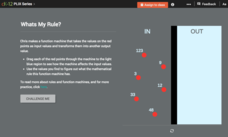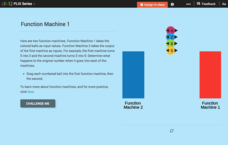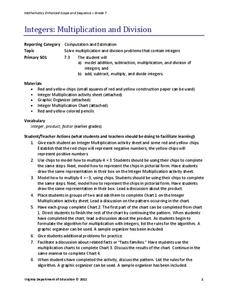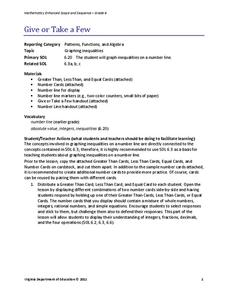CK-12 Foundation
Function Rules for Input-Output Tables: Whats My Rule?
What's the rule that makes it true? A virtual function machine generates output values as learners submit the input values. Their job is to analyze the inputs and outputs for a pattern and write a function rule.
Curated OER
Alice in Fractalland
Take your class on a field trip to Fractalland where they'll learn all about number and shape patterns. Based on Disney's movie Alice in Wonderland, this resource takes young mathematicians on an adventure as they explore patterns in...
CK-12 Foundation
Function Rules for Input-Output Tables: Function Machine 1
Challenge your classes to find the pattern of a double function machine. After recording the outputs of both machines, learners identify the pattern and the corresponding function. Both patterns involve adding/subtracting a constant.
CK-12 Foundation
Function Rules for Input-Output Tables: Soda Sugar Function Table
Examine the relationship between the input and output variables in a table of values. As learners build an input-output table using online manipulatives, they begin to identify patterns. They answer questions about these patterns...
EngageNY
Even and Odd Numbers
Even or not, here I come. Groups investigate the parity of products and sums of whole numbers in the 17th lesson in a series of 21. Using dots to represent numbers, they develop a pattern for the products of two even numbers; two odd...
Virginia Department of Education
Relationships Round Robin
Mathematics is all about patterns. Young mathematicians analyze geometric patterns to write algebraic expressions. They use the expressions to predict future stages of the patterns.
Virginia Department of Education
Integers: Multiplication and Division
Rules are meant to be broken ... but not integer multiplication and division rules. Learners use chips to model integer multiplication and division. The results of the activity help them develop integer rules for these operations.
Virginia Department of Education
Integers: Addition and Subtraction
Young mathematicians construct their own understanding of integers with an inquiry-based math lesson. Using colored chips to represent positive and negative numbers, children model a series of addition and subtraction problems as...
University of Utah
Representations of a Line
Line up to learn about lines! Scholars discover how to express patterns as linear functions. The workbook then covers how to graph and write linear equations in slope-intercept form, as well as how to write equations of...
Radford University
Fibonacci is All Around
One ratio to rule them all. Young mathematicians investigate the Fibonacci sequence and the Golden Ratio. To begin the first lesson, they use a spreadsheet to see how the Fibonacci sequence gives the Golden Ratio. The second lesson...
Willow Tree
Linear Relationships
There's just something special about lines in algebra. Introduce your classes to linear equations by analyzing the linear relationship. Young mathematicians use input/output pairs to determine the slope and the slope-intercept formula to...
West Contra Costa Unified School District
Fractional Exponents and Property of Exponents
Don't just use a fraction of this resource ... use it all. Learners first investigate patterns to determine how to deal with fractional exponents. Individuals then evaluate expressions involving fractional exponents.
Rice University
Calculus Volume 3
See calculus to the end. The eBook is the last of a three-volume series covering college-level calculus topics. Scholars begin with parametric equations and polar coordinates before moving to vectors, finally ending with multi-variable...
Mathematics Vision Project
Quadratic Functions
Inquiry-based learning and investigations form the basis of a deep understanding of quadratic functions in a very thorough unit plan. Learners develop recursive and closed methods for representing real-life situations,...
Virginia Department of Education
Give or Take a Few
Young mathematicians extend their knowledge of rational numbers on a number line to graph inequalities by first using number cards to compare rational numbers. They finish by using similar reasoning to graph inequalities on a number line.
West Contra Costa Unified School District
Arithmetic Series
Fall for a series. Learners determine how to find out how far a skydiver falls in the first 20 seconds. The Algebra II lesson introduces the idea of adding up the terms of an arithmetic sequence. Pupils learn how to use Sigma notation to...
Illustrative Mathematics
How Many _______ Are In. . . ?
Help your learners gain meaningful understanding of dividing fractions using fraction models. The activity includes nine problems which are sequenced to show how the fraction division algorithm evolves. Have students use graph paper or...
University of Utah
Functions
Define, explore, compare, and analyze functions with the fourth chapter of a 10-part eighth-grade workbook series. After encountering the definition of a function, pupils begin to explore linear and nonlinear functions. They then...



















